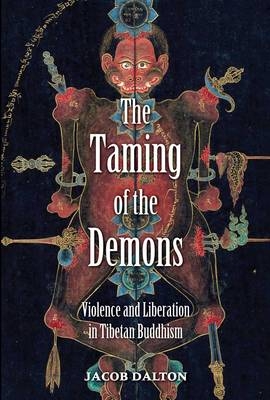
The Taming of the Demons
Violence and Liberation in Tibetan Buddhism
Seiten
2011
Yale University Press (Verlag)
978-0-300-15392-7 (ISBN)
Yale University Press (Verlag)
978-0-300-15392-7 (ISBN)
- Titel ist leider vergriffen;
keine Neuauflage - Artikel merken
Explores the ways in which violence has been integral to the development of Tibetan Buddhism.
The Taming of the Demons examines mythic and ritual themes of violence, demon taming, and blood sacrifice in Tibetan Buddhism. Taking as its starting point Tibet’s so-called age of fragmentation (842 to 986 C.E.), the book draws on previously unstudied manuscripts discovered in the “library cave” near Dunhuang, on the old Silk Road. These ancient documents, it argues, demonstrate how this purportedly inactive period in Tibetan history was in fact crucial to the Tibetan assimilation of Buddhism, and particularly to the spread of violent themes from tantric Buddhism into Tibet at the local and the popular levels. Having shed light on this “dark age” of Tibetan history, the second half of the book turns to how, from the late tenth century onward, the period came to play a vital symbolic role in Tibet, as a violent historical “other” against which the Tibetan Buddhist tradition defined itself.
The Taming of the Demons examines mythic and ritual themes of violence, demon taming, and blood sacrifice in Tibetan Buddhism. Taking as its starting point Tibet’s so-called age of fragmentation (842 to 986 C.E.), the book draws on previously unstudied manuscripts discovered in the “library cave” near Dunhuang, on the old Silk Road. These ancient documents, it argues, demonstrate how this purportedly inactive period in Tibetan history was in fact crucial to the Tibetan assimilation of Buddhism, and particularly to the spread of violent themes from tantric Buddhism into Tibet at the local and the popular levels. Having shed light on this “dark age” of Tibetan history, the second half of the book turns to how, from the late tenth century onward, the period came to play a vital symbolic role in Tibet, as a violent historical “other” against which the Tibetan Buddhist tradition defined itself.
Jacob P. Dalton is assistant professor of Tibetan Buddhist studies in the Department of East Asian Languages and Cultures and the Department of South and Southeast Asian Studies, University of California, Berkeley.
| Zusatzinfo | 7 b-w illus. |
|---|---|
| Sprache | englisch |
| Maße | 156 x 235 mm |
| Gewicht | 635 g |
| Themenwelt | Geisteswissenschaften ► Geschichte ► Regional- / Ländergeschichte |
| Geisteswissenschaften ► Religion / Theologie ► Buddhismus | |
| ISBN-10 | 0-300-15392-9 / 0300153929 |
| ISBN-13 | 978-0-300-15392-7 / 9780300153927 |
| Zustand | Neuware |
| Haben Sie eine Frage zum Produkt? |
Mehr entdecken
aus dem Bereich
aus dem Bereich
Erinnerungen
Buch | Softcover (2024)
Pantheon (Verlag)
16,00 €
Universalgelehrter, Polarreisender, Entdecker
Buch | Hardcover (2024)
mareverlag
28,00 €


